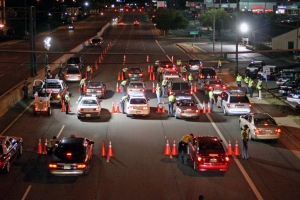Many of us have seen or come across a DUI checkpoint. Do you know what your rights are if you are forced to enter one? Did you know that you can challenge the legality of those checkpoints if you were arrested for DUI? This article discusses the requirements for DUI checkpoints in Charleston, South Carolina and what the state (prosecution) must show for the checkpoint and your DUI arrest to be legal.

Are DUI checkpoints legal in South Carolina?
Yes, but only if they are performed in a specific manner that complies with the law. When police set up a DUI checkpoint, you are seized, albeit briefly, triggering your rights under the Fourth Amendment against unreasonable government search and seizures.
Requirements for a DUI Checkpoint
Must have a Stated Purpose – Police cannot just randomly set up a DUI checkpoint whenever or wherever they want. They must have a “stated purpose,” other than the ordinary criminal wrongdoing otherwise the stop is a violation of your Fourth Amendment rights. City of Indianapolis v. Edmonds.
What makes a DUI checkpoint legal – in Brown v. Texas, our U.S. Supreme Court held that courts must balance three factors in determining the constitutionality of a checkpoint:
- The gravity of the public interest served by the seizure;
- The degree to which the seizure serves the public interests; and
- The severity of the interference with individual liberty.
Under the first factor, the checkpoint must be designed for the necessity of insuring roadway safety. The second factor requires the state to produce empirical data to support the effectiveness of its roadblock. See State v. Groome. Failure to produce this evidence will render the roadblock unconstitutional. This is one of the main reasons you need to retain a DUI attorney to review your DUI arrest from a DUI checkpoint, a lot of this information has to be specifically requested.
Documented requirements specific to South Carolina
Departmental Policy – Police should use a policy that addresses all aspects of the DUI checkpoints from officer training, equipment to be used, to media relations.
Identify and study problem areas – gather statistical data validating police action at the location in question.
Site selection – a specific plan around the actual checkpoint site, considering environmental issues, with safety being the priority in the checkpoint construction.
Visible Police Authority – the checkpoint should be visible as a police action. Adequate lighting and the checkpoint illuminated to alert the motorist of it.
Detention and investigative techniques – initial contact with motorists should be kept brief and if impairment suspected, then the motorists should be directed out of the flow of traffic and into a designated roadside test area.
Supervising the checkpoint – a supervisor must establish the roadblock and there must be a supervisor at the scene during the checkpoint.
Motorists must be stopped in a specified manner – police cannot stop vehicles randomly, they must stop motorists in a neutral way, for e.g. stop every vehicle, every other vehicle, every third-fourth vehicle.
Charleston DUI Lawyer, South Carolina
If you have been arrested for DUI at a DUI checkpoint Charleston, South Carolina call an experienced and trusted Charleston DUI Lawyer at the Dale Savage Law Firm, today 843-530-7813.

